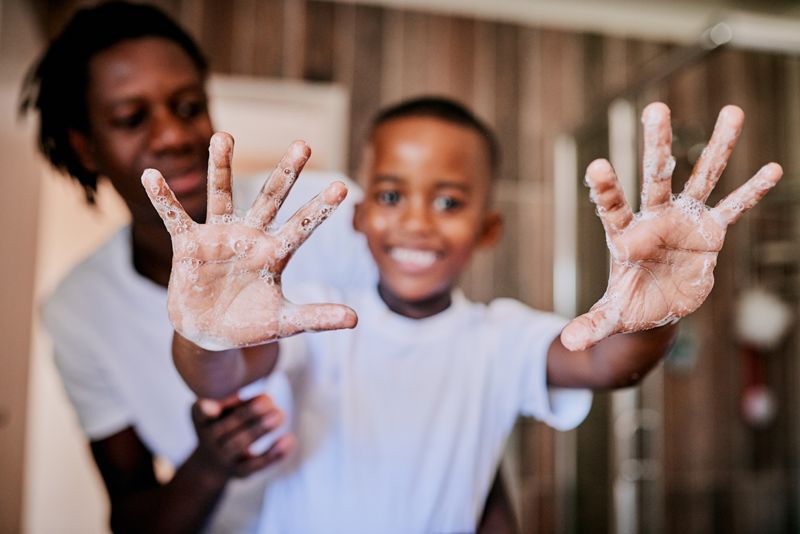The COVID-19 virus has definitely turned our world upside down. But, there are certain precautions that we can take to protect our health and eyes during the COVID-19 Pandemic. Using common-sense while taking extra precautions like shielding our eyes and practicing good hygiene can play an important role in helping to lower the chance of contracting a COVID-19 infection. Here are 5 tips to help protect yourself and your eye health during the COVID-19 pandemic.
Tips to Protect Yourself and Your Eye Health During the COVID-19 Pandemic
1. Shield your eyes with glasses to add a layer of protection.

A man wears a mask and glasses to protect himself during the COVID-19 pandemic.
Not everyone is aware, but our eyes are a point that can allow viruses to enter our bodies. Our eyes are covered by a large mucous membrane, which typically protects our body from dirt and debris, but unfortunately, it can also be an entryway for infection. Adding an extra layer of safety in front of our eyes can help to reduce the chance of infection. Wearing your ordinary prescription eyeglasses or sunglasses helps to shield your eyes from other people’s respiratory droplets that may be infected with viruses. This is why often in health care settings, where people are caring for highly contagious ill patients, health care workers will wear a face shield or safety goggles. A face shield and safety goggles offer higher protection than regular eyewear. But, regular eyewear definitely offers more protection than wearing nothing over your eyes at all.
2. Avoid touching your face and eyes.
Avoiding touching your face and eyes is sometimes easier said than done. This is a natural habit that can be hard to break. But making a conscious effort to refrain from doing this will lower your chance of catching an infection. If you absolutely need to touch your face, make sure you do so with clean hands that have been washed with soap and water for at least 20 seconds. If you don’t have clean water to wash your hands, hand sanitizer is your next best bet. If you don’t have either water or sanitizer use a tissue to touch your face with.
3.) Keep Your Eyes Moist and Hydrated
Having dry eyes can make for lots of discomfort. But having dry eyes can also leave you vulnerable to eye infections as well. With dry eyes, there is often areas of the cornea which has areas of damaged cells. These areas of small micro-perforations within the surface of the cornea act as an easy opening for viruses to enter the body. Also, people with dry eyes may have the urge to rub their eyes with their hands more often. As stated above, touching our eyes with dirty hands can introduce us to viral and bacterial infections.
If you have symptoms of dry eyes, there are many helpful eyedrops that your optometrist might recommend to help alleviate dry eye symptoms. Some of these medications can be purchased over the counter, where others might be prescription. It is always best to check with an eye care professional, regarding which dry eye drop is best for you.
4.) Take a break from contact lenses.
Wearing contact lenses doesn’t necessarily lead to an increased risk of getting COVID-19. But, handling contact lenses with dirty hands does increase a contact lens wearers risk of being exposed to viruses and bacteria. It’s a fact that contact lens wearers touch their eyes more than the average person. By swapping out contact lenses for eyeglasses you will not only touch your eyes less but you also add an extra layer of protection to your face by shielding your eyes with glasses.
Click here for hygiene tips about wearing contact lenses.
5.) Common Sense Is Key – Practice proper hygiene.

Handwashing can reduce spreading viruses like COVID-19.
There can be so much concerning info regarding the coronavirus. But, it is important to remember that practicing common sense plays a huge role in helping to reduce the chance of contracting the COVID-19 virus. Keeping hands clean by frequent washing with soap and water or hand sanitizer is really important. Also, make sure to try to avoid touching your face mouth, nose, and eyes included. Common sense precautions such as this not only limit your chance of contracting the coronavirus but help prevent other viruses and bacteria from entering the body as well. I consider these common-sense precautions because I think we should be doing this all the time, not only when faced with an illness outbreak or pandemic.
Slowing down the spread of the COVID-19 coronavirus takes a communal effort. So it’s important that we all try and do our part. I hope that you can maybe implement some of these tips into your daily routine to help keep yourself and your eyes safe.
This article was written by Trina Vanaalst, licensed optician, and contact lens practitioner.

